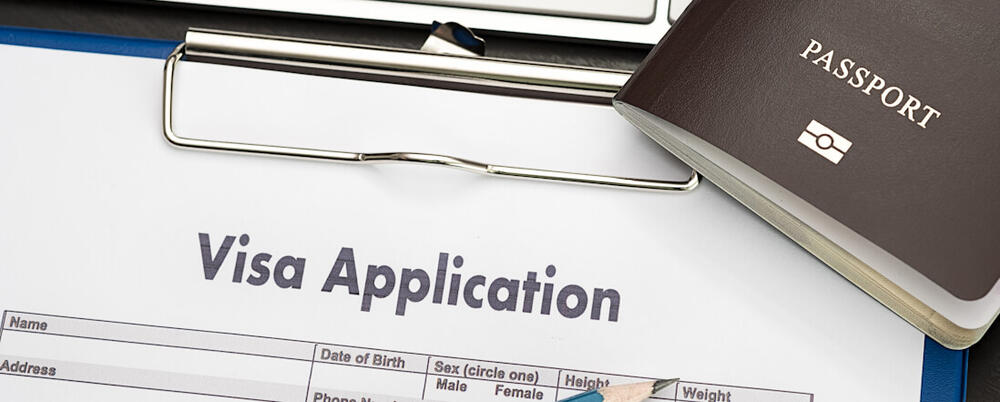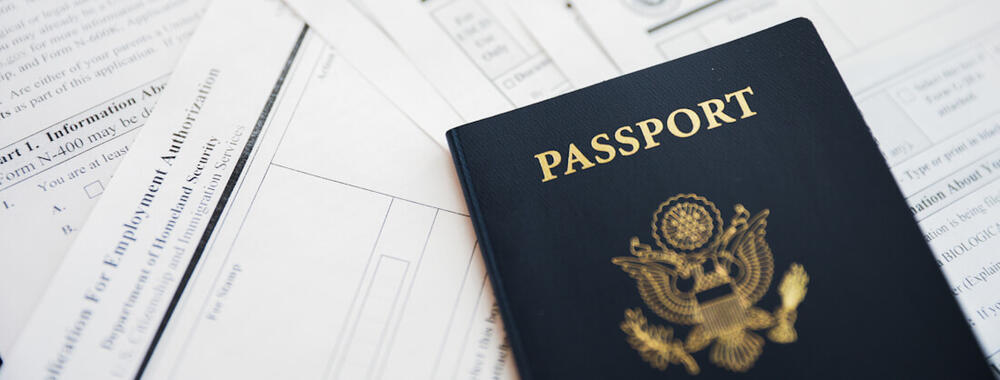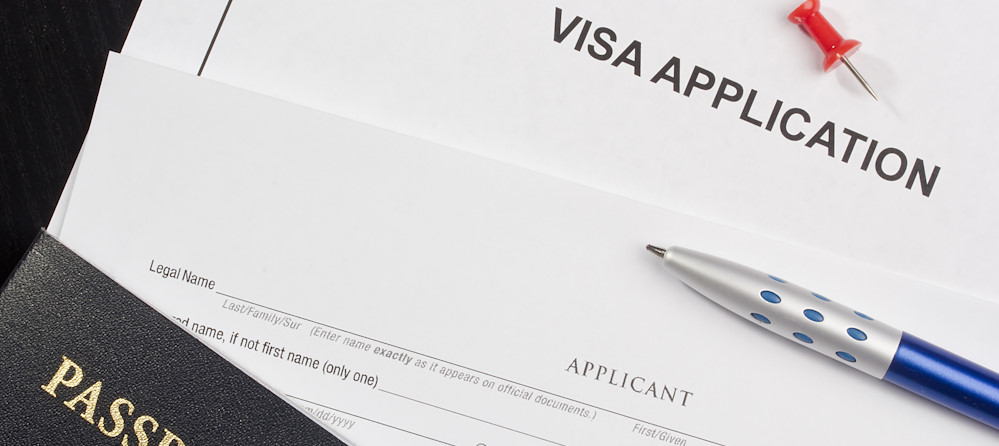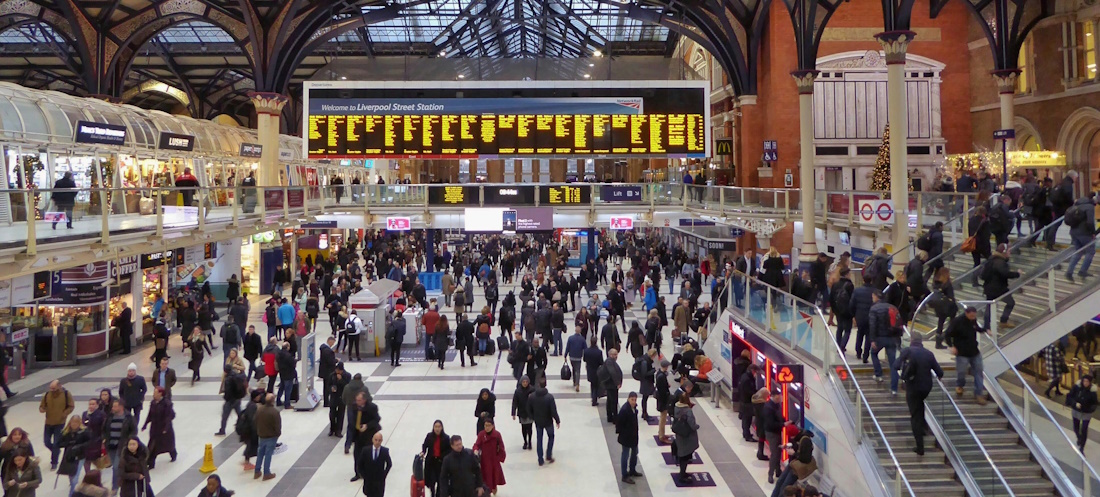- Hold down
Ctrlkey and select the sections you want to print. If using a Mac, hold down theCmdkey. - Use
Ctrl + Aor on Mac,Cmd + Ato select all sections (if you are using the Chrome browser). - Click "Apply" and the site will customise your print guide in the preview below.
- Click the "Print" button and a print pop up should appear to print to your printer of choice.
Articles about the United Kingdom
Accommodation in the United Kingdom
The quality and affordability of housing in the United Kingdom varies widely. If you're an expat, you may struggle to find spacious, high-quality accommodation that doesn’t break the bank in notoriously expensive London, but there are many areas of the UK where it’s much easier to find appropriate housing at a decent price.
Types of accommodation in the United Kingdom

Accommodation in the UK is generally in the form of houses – whether freestanding or row houses (terraced housing) – and apartments (flats). All these types of housing are widespread throughout the UK, with flats dominating in the more urban areas.
House-sharing (renting an individual room in a larger house shared by others) is another popular option if you're a single expat in the United Kingdom – and is an avenue usually pursued out of financial necessity. Still, for young expats, this can be a great way to meet new people.
Furnished vs unfurnished
When searching for somewhere to rent, you'll need to decide whether to rent a furnished or unfurnished property.
An unfurnished property typically includes kitchen and bathroom fixtures, as well as appliances such as a fridge, cooker, and possibly a dishwasher and washing machine. Carpets and often curtains are included, but not furniture such as beds or sofas.
A furnished property will include furniture such as sofas and armchairs in the living room, tables and chairs in the dining area, and beds, wardrobes and chests of drawers in the bedrooms. Some will even include TVs, kitchen utensils and cutlery.
Many expats and assignees choose to rent a furnished property to save the worry and expense of sourcing furniture or having it shipped from abroad. It may cost slightly more to rent a furnished flat or house, but the difference in cost is often marginal.
Short lets and temporary housing
If you're new to the UK, you might choose to stay in temporary housing while searching for a more permanent place to live. This is usually a more cost-effective and convenient alternative to hotels. There are a number of specialist providers of temporary housing in the larger cities, and holiday rental sites such as Airbnb are also an option.
Finding rental accommodation
Finding a property to rent in the UK isn’t too difficult, especially if you are flexible about the exact area you want to live in. Online property portals such as Rightmove, Zoopla and On the Market are a great starting point as they allow you to research the cost and availability of properties in various areas, even before you arrive in the UK. These websites include photos, details and floor plans for available properties and are updated regularly by local real estate agencies.
Once you have decided on an area or suburb, it is worth building a relationship with local real estate agents, as they will have intimate knowledge of the local area. They may also have access to property listings before they are publicly advertised. Some people moving to the UK employ a local relocation agency to liaise directly with estate agents and shortlist properties for viewing.
If you are a student or on a tight budget, you might decide to rent a room in a house rather than renting a whole property. There are a few property portals that specialise in house-share, such as SpareRoom.
Useful links
Renting accommodation in the UK

Most expats in the UK opt to rent rather than buy property. This is partly due to the temporary nature of expat assignments and the high cost of housing, especially in the capital. The process of renting property is generally the same throughout the UK, although finding property in larger, more populated cities is typically much harder.
Signing a lease
Once you have found a suitable property, you must sign the lease to secure it. Most tenancies in the UK are Assured Shorthold Tenancies (ASTs), which provide standard protection to both tenants and landlords. Lease agreements in the UK are usually signed for one year, with the option to extend.
With one-year leases, a six-month break clause can typically be negotiated. This allows you to terminate the contract at any time after the first six months by giving the landlord either one or two months’ notice.
If this negotiable clause is included, it's important to note that it may also allow the landlord to terminate the lease early without giving a reason, though this is rare.
Most landlords in the UK will expect you to provide a security deposit that amounts to five weeks’ rent. The landlord or their agent must lodge the deposit in a government-approved Tenancy Deposit Scheme (TDP). In most cases, references and letters from an employer or payslips will be required to secure a property.
Pets
You should seek prior written consent from your landlord if you wish to keep a pet on the property.
Termination of the lease
A landlord may charge a cleaning fee if you do not leave the property in good condition, so it’s essential for you to get your property professionally cleaned before you leave.
A landlord will not charge for fair wear and tear, such as wearing of carpets, scuffed wooden flooring or faded paint, as this is an inevitable part of letting out a property. Damage beyond ordinary wear and tear can result in deductions from the deposit. The landlord is also likely to make deductions from the deposit for lost keys and unpaid utility bills.
The landlord or their agent should return the deposit within ten days of agreeing on how much will be refunded. Your deposit will be protected in the TDP scheme until any issues are resolved.
Utilities
When you sign a rental contract, you should ensure you know what additional costs you’re liable for. These costs will typically consist of council tax, gas, electricity, water, and internet. As these expenses have the potential to significantly increase accommodation costs, they need to be considered when budgeting.
For more details, see Setting up Household Utilities in the UK.
Embassy Contacts for the United Kingdom
United Kingdom embassies
- British Embassy, Washington, DC, United States: +1 202 588 6500
- British High Commission, Ottawa, Canada: +1 613 237 1530
- British High Commission, Canberra, Australia: +61 2 6270 6666
- British High Commission, Pretoria, South Africa: +27 12 421 7500
- British Embassy, Dublin, Ireland: +353 1 205 3700
- British High Commission, Wellington, New Zealand: +64 4 924 2888
Foreign embassies in United Kingdom
- United States Embassy, London: +44 20 7499 9000
- Canadian High Commission, London: +44 20 7004 6000
- Australian High Commission, London: +44 20 7379 4334
- South African High Commission, London: +44 20 7451 7299
- Irish Embassy, London: +44 20 7235 2171
- New Zealand High Commission, London: +44 20 7930 8422
Pros and Cons of Moving to the UK
Moving to the United Kingdom, like moving anywhere, comes with both positives and negatives, and it is important for you as a prospective expat to weigh these up before making the decision to relocate. Here is our list of pros and cons of moving to the UK.
Healthcare in the UK

+ PRO: Access to the NHS
Living in the UK will give you access to a good standard of healthcare through the NHS (National Health Service) at little to no cost. The cost of medication is often subsidised and therefore likely to be cheaper than in many other countries.
- CON: Long NHS waiting lists
The downside of using the UK’s publicly funded health service is that there are often long waiting lists for specialist treatments. You can bypass these waiting lists by using private healthcare, but this comes at a significant cost. You should invest in a good health insurance policy if you have chronic conditions.
Education in the UK
+ PRO: Access to free education
If you are legally resident in the UK, you have the right to send your child to a public school at no cost. This option is worth exploring, especially if your children speak English or are young enough to pick up the language.
- CON: Standard of public schools is variable
While public schools in the UK are free, the standard of education varies considerably. Better public schools tend to be oversubscribed, with priority given to students living locally. There are also lots of failing schools, especially in inner-city areas. It’s worth investing time in reading a school’s Ofsted report in order to make an informed decision.
Weather in the UK
- CON: Unpleasant weather
The UK is known for its less-than-stellar weather. Winters are long, cold, and dreary. During the winter months, the days are short and it gets dark early. Basically, bring a coat or six.
+ PRO: People make the most of the summer
The British summer may be nothing remarkable to those from more exotic destinations, but Brits make the most of every little bit of sunshine. The country comes alive in the summer months when people can be seen enjoying the sunshine in the local park or spending an afternoon in a beer garden.
Lifestyle in the UK
+ PRO: The UK is at the forefront of arts, culture and sporting events
Living in the UK will give you access to some of the world’s leading arts, culture, and sporting events. Many international events are held in the UK’s major cities, such as London, Manchester, Liverpool and Edinburgh. Thanks to the UK being a relatively small country with an efficient transport network, travelling around to see your favourite team play football or to catch an international music act on tour isn’t too much hassle.
- CON: Traditional British food is mediocre
The British don’t have much to boast about when it comes to their traditional cuisine. Beyond fish and chips, a full English breakfast, and a lot of beer, there isn’t much to get excited about. That said, the beauty of living in a country with such a diverse population is that in almost every town or city, you are sure to find a wealth of international food offerings to keep things interesting. And cities such as London have plenty of Michelin-starred eateries.
Local culture in the UK
+ PRO: Diversity
The UK has a long history of immigration, which contributes to the diversity of its population. This is especially evident in the make-up of its major cities such as London, Manchester, and Edinburgh. You will be able to connect with many people who have similar experiences of moving overseas.
+ PRO: Proximity to Europe
A huge advantage of living in the UK is its easy access to the rest of Europe. Thanks to the growth of budget airlines, it is possible to travel to a whole host of fantastic European destinations without breaking the bank.
- CON: Brexit has affected movement
Brexit has led to restricted movement to the EU, as well as other negative effects such as fuel, food, and labour shortages.
Visas for the UK

- CON: Visa requirements are very stringent
The UK is a hugely popular expat destination, but the country has become increasingly strict about who they allow into the country. You have to meet a multitude of requirements before being granted a work permit for the UK.
+ PRO: Opportunities for skilled workers
Despite visa restrictions, Britain has a history of sourcing skilled workers from abroad. If you have sought-after skills, you should be able to move to the UK easily. The visa processing system itself is pretty efficient as long as you have all your paperwork in order.
Working in the UK
+ PRO: Strong labour laws and generous employee benefits
If you are working full-time in the UK, you are entitled to a minimum of 20 days annual leave per year. Sick leave and parental leave benefits in the UK are also fairly generous.
- CON: Highly competitive job market
Many industries in the UK are highly competitive. While some companies provide excellent employment packages, these lucrative offers are often only made to highly skilled workers at the top of their field of work.
Public Holidays in the United Kingdom
| 2024 | 2025 | |
|---|---|---|
| New Year's Day | 1 January | 1 January |
| Good Friday | 29 March | 18 April |
| Early May Bank Holiday | 6 May | 5 May |
| Spring Bank Holiday | 27 May | 26 May |
| Christmas Day | 25 December | 25 December |
| Boxing Day | 26 December | 26 December |
*The above public holidays are celebrated throughout the United Kingdom. There are a number of additional public holidays that are particular to one or more countries within the UK, or that occur throughout the UK a few weeks apart. Expats should check their country's calendar for definitive dates. When a public holiday falls on a Saturday or a Sunday it is moved to the first available weekday.
Diversity and Inclusion in the UK
Whether you are residing in, moving to, or conducting business within the country, understanding the landscape of diversity and inclusion in the United Kingdom is essential. From the bustling streets of London to the serene landscapes of the Scottish Highlands, the UK is continually evolving to meet the needs of its diverse population.
Below, we delve into various aspects of diversity, including accessibility, LGBTQ+ rights, gender equality, and more, highlighting the strides and ongoing efforts in fostering an inclusive environment in one of the world's most culturally diverse nations.
Accessibility in the UK
People visiting, living, or working in the United Kingdom are protected against discrimination by law. This means equal opportunities for all, including those with limited mobility. Public sector organisations and businesses are legally bound to ensure premises are accessible and free from barriers to those using mobility aids such as wheelchairs. Most major towns and cities, particularly London, have made considerable strides in improving access. However, advances in accessibility have been made across the UK, even in relatively rural areas.
Most people arrive in the UK at one of London’s hub airports, but regional terminals across the UK cater to an ever-increasing number of international travellers. Most feature highly efficient terminals, well linked by road and rail. Passengers can expect high-quality facilities and well-trained staff to help them on arrival, with several onward travel options.
As a result of rebuilding post-WWII, many UK cities have fewer uneven, cobblestone streets and public places than comparable European centres. The capital also underwent much construction before hosting the 2012 Olympic Games, becoming more accessible to athletes and tourists.
Buses in London and the provinces are accessible to all and make use of low floors and retractable ramps. Travel is free for wheelchair users or anyone registered as blind. Assistance dogs are also permitted on all public transport in the UK.
The UK’s largest metro service is the London Underground (although much of it runs overground), often called ‘the Tube’. Around a third of underground stations, half the overground stations, most river taxi piers, all tram stops, the IFS Cloud Cable Car, and all Docklands Light Railway (DLR) stations are fully accessible. There are special maps and apps for the visually impaired. Transport for London (TfL) also has trained staff to help at each station with ticket machines, and blind passengers can ask for assistance to be led to and from platforms.
All taxis accept foldable wheelchairs, and many (particularly ‘Black Cabs’ in major cities) are fully accessible using ramps. TfL offers subsidised fares for those with mobility issues using a Taxicard scheme, and a door-to-door service called Dial-a-Ride is available in much of the UK. This free service is available for shopping or visiting friends and family, but not for travelling to work.
Useful resources
LGBTQ+ in the UK
London is one of the most diverse and progressive cities in the world. Diversity is in the rainbow makeup of the capital’s almost 9 million residents. Same-sex marriage is legal in every part of the UK, and foreign same-sex marriages are also recognised, provided they have been performed correctly per the law of their originating country.
The UK commemorated 50 years of Pride in 2022 – celebrated in all large cities – notably Brighton, an hour from London and famed for its LGBTQ+ community and social scene. London hosts various inclusive groups and organisations to help everyone feel at home. Soho and the West End famously offer open nightlife for people from all walks of life into the early hours, including one of the best clubbing scenes in the world.
London is also home to the UK’s only museum dedicated to LGBTQ+ history. It’s an inclusive space that proudly welcomes everyone – regardless of gender or sexuality – dedicated to celebrating the stories, people and places that are intrinsic to the queer community in the UK and beyond.
Useful resources
Gender equality in the UK
2018 marked 100 years since women in Britain won the right to vote. Discrimination based on gender is illegal in the UK: everyone, regardless of gender, can expect the same rights and opportunities. While the pay and power gap between males and females still exists, progress is being made.
Useful resources
Women in leadership in the UK
Across the UK, women earn 13 percent less than men in the same roles and hold just 38 percent of managerial positions. All employers are expected to take proactive steps to ensure women are paid and treated equally in the workplace. They are encouraged to demonstrate a zero-tolerance approach to every form of discrimination or harassment. Year-on-year, women’s representation on company boards and salaries relative to their male equals are becoming more balanced.
Useful resources
Mental health in the UK
Life as an expat can be stressful, and it’s not uncommon to experience problems with emotional well-being through concerns about work, family, finances or the future. Mental health support is widely available in the UK through the National Health Service (NHS) and many private providers. Traditional societal barriers and stigma have been broken down, and public and professional attitudes are open to talking about and supporting mental health needs.
Useful resources
Unconscious bias in the UK
Unconscious bias refers to the prejudices absorbed when living in unequal societies. Preconceptions around gender, age and ethnicity inhibit effective hiring, limit development and lower staff morale.
The UK government and large organisations are improving many practices that hold minority groups back, including reforms to recruitment processes and mentoring. There is still progress to be made, but the UK leads many European countries in promoting equal opportunity for all in the workplace.
Diversification of the workforce in the UK
Diversity recognises that everyone is different in visible and non-visible ways, and those differences should be respected, valued, promoted and celebrated. Most urban areas look and feel multicultural, particularly if one spends time in any international company. Almost 20 percent of IT professionals in the UK were born overseas, and nearly a third of tech specialists in London are from ethnic minority backgrounds. Public services are actively recruiting to ensure their staff makeup matches the ethnic mix of the population at large.
Useful resources
Safety in the UK
Regarding overall safety, England ranks 38th out of 195 countries in the Global Finance Safest Countries Index, which accounts for natural disasters, war, Covid deaths and personal security. The UK is largely a safe place to live and work, but some poorer, more urbanised areas still have higher crime rates than average. Violent crime is relatively rare, but some British cities are less safe at night, in part due to increased alcohol consumption in the evening. Still, most people feel safe on the streets and in their homes. Taxis and public transport are safe and reliable, as expected in a developed country. Pickpocketing is the most common form of street crime, mainly targeting tourists around popular landmarks.
Women’s safety in the UK is similar to much of continental Europe. Walking alone at night does present dangers in certain city suburbs, but common sense and awareness prevail – and women can dress as they wish without fear or judgement.
Useful resources
Calendar initiatives in the UK
- 4 February – World Cancer Day
- 8 March – International Women’s Day
- 19 May – Global Accessibility Awareness Day
- June – Pride Month
- 10 September – World Suicide Prevention Day
- October – Breast Cancer Awareness Month
- 10 October – World Mental Health Day
- November – ‘Movember’ (Prostate Cancer Awareness and Men’s Mental Health Month)
- 14 November – World Diabetes Day
- 1 December – World AIDS Day
Work Permits for the United Kingdom
Securing a work permit for the United Kingdom involves meeting a strict set of criteria. Since Brexit, and after major reforms in 2024 and 2025, the bar for entry is higher than ever. The government has significantly raised salary thresholds across most categories to cut reliance on overseas labour.
Unless you are an Irish citizen or hold status under the EU Settlement Scheme, you generally need a visa to work here. Exceptions are rare, such as the ‘Permitted Paid Engagement’ route, where experts are invited for a specific, short-term purpose.
Useful links
Types of work visa in the United Kingdom

There are several types of work visas in the United Kingdom, but options have narrowed due to stricter salary thresholds. While the range of available permits is broad, the financial criteria for sponsorship are now much tougher.
Skilled Worker Visas
This is the primary route for expats. You need a confirmed job offer from a licensed sponsor. The government has replaced the old shortage list with a stricter Immigration Salary List (ISL) and a newly introduced Temporary Shortage List (TSL) for critical infrastructure roles.
To qualify, you need to score points for:
- Sponsorship: A valid Certificate of Sponsorship from a licensed employer (20 points). The Immigration Skills Charge paid by employers is increasing by 32 percent in December 2025, which may impact hiring decisions.
- Skill Level: The role must be at the appropriate skill level (RQF Level 6 – graduate level) (20 points).
- English Language: You must prove proficiency (10 points). Heads up: From January 2026, the required level for Skilled Workers increases from B1 to B2 CEFR.
- Salary: Your pay must meet the high general threshold or the specific ‘going rate’ for the role, whichever is greater (20 points).
Global Business Mobility Visas
If a current employer is transferring you to a UK branch, the Global Business Mobility Visa is the likely path. It covers senior managers, specialists, and graduate trainees. This route does not lead to settlement (ILR), meaning you cannot stay indefinitely.
Youth Mobility Scheme Visa
Nationals from countries including Australia, Canada, Japan, and South Korea aged 18 to 30 (or 35 for some) can live and work in the UK for up to two years. This route provides flexibility as it does not require a specific job offer or sponsorship.
Seasonal Worker Visa
Designed for horticulture and poultry work, this visa is temporary. Recent changes now allow seasonal workers to spend up to six months in the UK within any rolling 10-month period, offering slightly more flexibility than the previous 12-month window.
Useful links
Applying for a work visa in the United Kingdom

When applying for a work visa in the United Kingdom, preparation is essential. While your employer handles the Certificate of Sponsorship, the burden of evidence falls on you. Be aware that costs are rising across the board: the Immigration Health Surcharge (IHS), which you typically pay upfront, is a significant expense, and the Immigration Skills Charge paid by employers is set to rise by 32 percent in December 2025.
Documentation must be impeccable. You need original documents, certified translations for anything not in English or Welsh, and proof of English proficiency. For roles in healthcare, education, or social services, providing a criminal record certificate from any country you’ve lived in over the last 10 years is mandatory.
Most applications are submitted online, followed by a biometric appointment. However, the physical Biometric Residence Permit (BRP) has been largely replaced by the ‘eVisa’ – a digital proof of status. Successful applicants now access their immigration status online rather than receiving a card.
Visa regulations are subject to change at short notice, and you should contact your local British embassy or consulate for the latest details.
Utilities in the UK
Most homes in the United Kingdom will already have a gas, water, electric and telephone supplier, and you will usually automatically take over these accounts if you’re a new tenant. You must check the meter readings on the day you move into the new home and ensure that the services are transferred into your own name.
Types of utility bills in the UK

Household utility bills typically cover various essential services and expenses. These bills will vary based on factors such as location, household size and usage patterns.
Household utility bills in the UK include:
Gas and electricity: These bills cover the cost of gas and electricity consumption. Gas and electricity suppliers are privatised in the UK, and as a tenant or homeowner, you can choose between different providers and easily swap them if you are out of contract. The seven largest energy suppliers are British Gas, Octopus, E.On, OVO, EDF, Scottish Power and Ecotricity, and they will allow you to select between both fixed and variable rates.
Many expats arriving in the United Kingdom will get help to set up utility providers from an agent or relocation company. If you’re not lucky enough to have this arranged for you, you can use companies like Please Connect Me to help manage utility set-ups at your new home.
Oil: Many rural properties are not connected to the gas network and have oil rather than gas boilers. The oil tank will need topping up every month or two. There are hundreds of companies that supply heating oil (kerosene), and you can use companies like Boiler Juice to compare prices.
Water: Most of the water companies in the UK are privatised, although they are generally the only supplier within their area, so there is no option to choose a different supplier. Water bills include charges for both water usage and sewage services, and the cost will vary depending on the region and the amount of water consumed. Some rural properties are not on the mains sewerage system and will have a septic tank or sewerage treatment plant that must be emptied and serviced regularly.
The deregulation of the English water market has introduced greater competition, especially for business customers, now allowing them to choose their water provider. New entrants like Business Stream, Water Plus and Wave have significantly impacted consumer choices and competition.
Council tax: This is a local tax collected by local authorities to fund services such as waste collection, street cleaning and local schools. The amount depends on the property’s valuation and the local council tax band.
TV licence: You must pay a TV licence fee if you watch or record live TV or use the BBC iPlayer. The fee contributes to funding the BBC.
Internet and phone: Charges for broadband internet and landline or mobile phone services are common household expenses. These bills may include fixed monthly charges as well as additional usage fees. When selecting a broadband supplier, consider speed, reliability, customer service and contract terms. Check for installation charges, equipment costs and potential cancellation fees. The UK’s largest telephone and broadband suppliers include BT, Virgin Media, Sky Broadband and TalkTalk.
Home insurance: While not strictly a utility bill, home insurance is an essential expense to protect against potential damages, theft, or other unforeseen events. The landlord usually covers building insurance.
Other services: Depending on your individual circumstances, you may be charged additional fees for services like home security systems, satellite or cable TV subscriptions and maintenance contracts.
Taking meter readings in the UK
All properties will have meters for their gas, electric and water supplies. The gas and electric meters will typically be within the property, although apartment buildings will often have them in the common areas. The water meter will typically be outside the property, on the street.
You may be asked to submit gas and electricity meter readings via the supplier’s website. A supplier representative will manually check these every few months, although many properties now have smart meters, which can be checked remotely by the company, providing accurate and real-time data on energy usage.
The letting agent or estate agents should take meter readings before the start of a tenancy or before a property is purchased, but you need to check the readings when moving in.
Paying utility bills in the UK
Most utility companies and councils send quarterly bills by post, which can be paid via a bank transfer or credit card online or over the phone. Direct Debit is the most common form of payment, automatically withdrawing money from the customer's bank account each month, similar to ACH Debits in the USA.
Price comparison websites
It’s critical to regularly review energy contracts and compare contracts between the different providers, and there are several price comparison websites that make this job easier. These comparison sites include:
Weather in the United Kingdom
Hardly known for its desirable climate, the United Kingdom is plagued by atmospheric instability and unpredictable weather due to its location. Many types of weather can be experienced in one day, and rain is possible at any time of year, with gloomy conditions often the norm.
Generally speaking, southern regions are more temperate and milder than northern areas. England enjoys the warmest temperatures on average and is typically more sunny and less rainy than the rest of the UK. Scotland has the coldest weather and is also the wettest country for most parts of the year.
Winters, between December and February, are cold and wet with occasional snow, especially in Scotland and the high-lying areas of England, Wales and Northern Ireland. When winter's grim, grey weather does lift, the country comes alive, and residents take advantage of the beautiful countryside and the many urban parks and gardens.
Between June and August, summers are warm and balmy, and although there are frequent showers, you might be surprised to discover that this season is largely quite pleasant. Days are exceptionally long, especially in northern areas, where the sun sets at around 10pm and rises at about 4am.
Doing Business in the United Kingdom
Although no longer in the driver’s seat of a worldwide empire, the United Kingdom is still a significant global economic power, and many expats are interested in doing business in the UK.
Each of the UK’s four countries – England, Scotland, Wales and Northern Ireland – retain their own unique characteristics. However, when it comes to the working world, their practices, etiquette, and culture are relatively similar, and all are governed by a uniform respect for politeness and courtesy.
While the business world remains conservative, the UK has become a thriving multicultural environment, and you'll find little ill-will directed toward enterprising foreigners.
The UK’s position as a popular place to do business is a clear result of its long-established political and economic stability, sound infrastructure and highly skilled workforce.
Fast facts
Business hours
Usually 9am to 5pm, Mondays to Fridays.
Business language
English is the language of business in the United Kingdom.
Dress
Business dress depends on the industry, but for most, it’s conservative and formal, with both men and women wearing dark suits (pantsuits are acceptable). Media and creative companies, with much more relaxed dress codes, tend to be an exception.
Greetings
A firm handshake is the best way to greet business contacts. Address senior business colleagues using their formal title until directed otherwise.
Gifts
Not expected, and borderline inappropriate. A round of drinks, on the other hand, is happily received.
Gender equality
The UK is relatively equal in terms of gender in the workplace, although there are still barriers to full equality.
Business culture in the UK

The key to successfully doing business in the UK is being able to read between the lines. You should be aware that deciphering the difference between what a person says and what they mean could take some practice.
Communication style
The British are reserved and pride themselves on good behaviour and manners. As a result, business dealings are incredibly diplomatic, with maximum effort directed at remaining considerate and civil. These fundamentals manifest in a restrained communication style, where directness is avoided, and evasive, cryptic and often humorous statements are substituted for what is actually meant.
You will need to be adept at understanding the subtleties of conversation, where tone and facial expression may be key indicators of true meaning, and humour is used as a defence mechanism or to mediate difficult situations.
Individualism
Individualism is highly valued in Britain, and you should anticipate working among colleagues who are competitive and ambitious. Experience and performance are the foundations for advancement in the working world, and those in management positions tend to be well-rounded.
Business hierarchy
A traditional hierarchy is still important in UK business, even though it’s moved towards a more egalitarian approach, where positions are more or less parallel to each other rather than existing below or above one another. As a result, duties and responsibilities can sometimes be unclear, which can be a point of frustration if you're accustomed to explicit directives and cultures of subordination.
Appearance and conduct
The British business sphere is still highly formal. Dress is conservative, punctuality is paramount, and outward displays of emotion are viewed with distaste.
Dos and don’ts of business in the UK
- Don’t underestimate the importance of polite requests. Specific instructions are often couched in a subtle ask.
- Do use humour in the workplace. The British respect wit and irony, often using these tactics to form relationships and to mediate difficult situations.
- Don’t ask colleagues or clients personal questions. The British are reserved and private and may view this as intrusive and rude.
- Do be on time. The British are punctual, and tardiness is considered discourteous. If lateness can’t be avoided, inform the relevant party beforehand.
Visas for the United Kingdom
Whether you plan to travel, take up a short-term job offer, or make a permanent move, deciphering the requirements for visas for the United Kingdom is the necessary first step. Entry protocols depend entirely on nationality: you either need a full visa or an Electronic Travel Authorisation (ETA). As the government frequently tweaks availability and processing rules, verifying exactly which permit suits your situation before booking a flight is the only way to ensure a seamless arrival.
The United Kingdom operates a rigorous points-based immigration system that applies the same standard to EU and non-EU nationals. Irish nationals remain the exception, retaining the right to live, work, and visit freely within the Common Travel Area. EU, EEA, and Swiss citizens can still visit for up to six months, although an ETA has been mandatory for these arrivals since April 2025. For those intending to establish a life in the UK, study, or work, a specific visa application is required.
Always check the official GOV.UK website for the absolute latest on immigration rules. Your local embassy or consulate is also a solid port of call for guidance tailored to your specific nationality.
Electronic Travel Authorisation (ETA)
Most visitors who previously enjoyed visa-free access now require an Electronic Travel Authorisation in the United Kingdom. This digital permission is mandatory for nationals from the USA, Canada, Australia, and Europe, and must be secured before boarding. It replaces the previous visa waiver arrangements for dozens of nationalities.
The ETA facilitates visits of up to six months for tourism, business meetings, short-term study, or medical treatment. An ETA grants permission to travel, not entry; the final decision rests with the Border Force officer upon arrival. The system is designed to speed up border processing without compromising security.
Applications via the UK ETA app or online are generally straightforward, with decisions typically returned within three days. Once approved, the ETA remains valid for two years or until your passport expires, whichever comes sooner. It allows for multiple trips within that window, provided no single stay exceeds six months.
Useful links
Visitor/tourist visas for the United Kingdom

Visitor and tourist visas for the United Kingdom are the standard route for those ineligible for an ETA planning short stays for holidays, business, or private medical treatment. Rules change often; for example, following updates in October 2025, nationals of Botswana and Palestine now require a standard visitor visa. In contrast, requirements have eased for German school groups (aged 19 and under), who may now enter using national ID cards rather than passports or visas. Standard visitor visas are typically valid for six months and allow for multiple entries, although long-term options are available for frequent travellers.
Visa-free entry and Electronic Travel Authorisation
While ‘visa-free’ entry technically still exists, it is now effectively linked to the ETA for most non-visa nationals. Irish citizens are the notable exception, exempt from both requirements.
EU, EEA, and Swiss citizens visiting with an ETA can utilise ePassport gates for a swifter arrival. National ID cards from these regions are no longer accepted at the border, except for those with settled status or specific groups such as the aforementioned German school parties.
Standard visitor visas
If your nationality does not qualify for an ETA, the Standard Visitor Visa is likely the necessary permit. This covers tourism, short courses, business conferences, or medical procedures for up to six months.
To get approved, you must demonstrate a genuine intention to leave the UK at the end of the visit, usually by showing onward travel plans and sufficient funds to cover the stay. The conditions are strict: you cannot undertake paid or unpaid work, access public funds, or marry. Unlike some jurisdictions, switching from a visitor visa to a work or student visa while inside the UK is generally not permitted.
Useful links
Student visas for the United Kingdom
Student visas in the United Kingdom vary based on the duration of the course. Short courses under six months usually fall under the Standard Visitor Visa or ETA rules, while anything longer necessitates the dedicated Student Visa.
Applicants aged 16 or older with a confirmed spot on a course with a licensed sponsor can apply. You must prove financial self-sufficiency and meet English language standards. Strict rules now prevent most international students from bringing family members as dependants, unless they are on a postgraduate research programme or a government-sponsored course.
Degree-level courses generally grant permission to stay for five years, while shorter courses cap at two years. Post-graduation options are also shifting. The Graduate visa currently allows two years (three for PhDs) to work or seek employment after finishing a degree. However, be aware that for Bachelor’s and Master’s graduates, this duration is set to reduce to 18 months starting 1 January 2027.
Recent updates also allow students to switch immediately to the Innovator Founder route upon course completion, which offers a direct path for entrepreneurial graduates.
Useful links
Family visas for the United Kingdom
Family visas for the United Kingdom allow individuals to join relatives – spouses, partners, children, or parents – for stays exceeding six months. The financial threshold for this route has risen sharply, with a significantly higher minimum income requirement for sponsoring a spouse or partner.
For stateless persons, the rules have been streamlined. Dependants (partners and children) can now apply under ‘Appendix Statelessness’ or ‘Appendix FM’ depending on when the family unit was formed, simplifying a previously complex process.
Useful links
Applying for a visa for the United Kingdom

Do not leave applying for a visa for the United Kingdom until the last minute. Processing times can be unpredictable, so submitting an application well ahead of the travel date is advisable.
While the application form is submitted online, most applicants must still visit a visa application centre to provide biometrics (fingerprints and a photo). However, the UK is rapidly moving towards a fully digital border. Physical Biometric Residence Permits (BRPs) have been phased out in favour of eVisas, so successful applicants increasingly receive digital proof of their status rather than a physical card.
Prepare for scrutiny regarding documentation. Depending on nationality and visa type, requirements may include a tuberculosis test certificate or overseas criminal record checks. All supporting documents must be in English or Welsh, or accompanied by a certified translation. Accuracy is vital; a missing page or incorrect format can stall an application for weeks.
Useful links
Permanent residence in the United Kingdom
Securing permanent residence in the United Kingdom usually involves applying for Indefinite Leave to Remain (ILR). Generally, you need five years of continuous residence to qualify, whether you are on a work visa or a family visa. For most work routes, you cannot have spent more than 180 days outside the UK in any rolling 12-month period.
ILR frees you from immigration control, so you can live and work without restriction. It is also the final stepping stone before naturalisation. While you can usually apply for British citizenship 12 months after being granted ILR, those married to British citizens can often apply immediately upon receiving their settled status.
Be aware that you risk losing ILR if you spend long periods away from the UK – typically two continuous years or more (or five years if you have settled status under the EU Settlement Scheme).
EU Settlement Scheme
The deadline for the EU Settlement Scheme (EUSS) has passed for most, but you can still apply if you have reasonable grounds for a delay or are joining a family member who already has status. This scheme protects the residency rights of EU, EEA, and Swiss citizens who were living in the UK before the end of 2020.
Useful links
Visa regulations are subject to change at short notice, and you should contact your local British embassy or consulate for the latest details.
Education and Schools in the United Kingdom
Arranging schooling and education in the UK is a top priority for expats. Attending the right school will play a significant role in ensuring your little ones' successful transition into expat life in the UK.
Factors that will affect your choice of school for your expat children include your child’s previous schooling experience, their academic ability, and their English language capability.
You should note that most government-funded schools in the UK and some independent schools base admission on catchment areas, so it’s often best to choose a school before deciding where to live within a city.
Education system in the United Kingdom
Although the education systems and schooling options vary slightly between England, Scotland, Wales, and Northern Ireland, they share the same basic structure. Typically, the academic year in the United Kingdom starts in September and ends in July, with the main breaks in December, March/April, and July/August.
The schooling system is divided into the following stages:
- Early years education: ages 3 to 5.
- Primary education: ages 5 to 11. It is subdivided into Key Stage 1 (ages 5 to 7) and Key Stage 2 (ages 7 to 11).
- Secondary education: ages 11 to 16. It is subdivided into Key Stage 3 (ages 11 to 14) and Key Stage 4 (ages 14 to 16).
- Post-16 education: ages 16 to 18, Key Stage 5.
Education is compulsory in the UK for children between the ages of five and 16. Most children start primary school during the school year when they turn five. Secondary school then begins at age 11.
At age 16, after completing their GCSE, students can optionally continue their secondary studies for a further two years, studying for A-Levels or BTEC awards. More and more schools in the UK are now offering students the opportunity to study for the International Baccalaureate (IB), which is recognised globally.
There are several options for schooling in the UK that you need to consider. Each type of school is unique and offers different benefits. With such a wide variety of options, there is sure to be something to suit the needs and budget of your expat family.
Useful links
State-funded schools in the United Kingdom

State schools are provided by the government at no cost to you if you are a British citizen or a foreigner legally residing in the UK. These schools are effectively funded by taxpayers.
The quality of education at state schools varies considerably. Some offer excellent teaching and facilities, while others fall short of the expected standard. Generally, the better state-funded schools will be found in more affluent areas.
An organisation known as Ofsted (Office of Standards in Education) does regular school inspections and publishes reports. These can be accessed online if you wish to find out about the quality of teaching and facilities at a particular school, as well as how the students at the school are doing academically.
Admission criteria vary from one school to the next. Most popular state schools base admissions on a particular catchment area, and you should be aware of this when deciding where to live in the UK.
There are various types of state schools that have slightly different approaches to teaching styles or curricula.
Community schools
Community schools are funded and managed by the local council. The council owns the school grounds and building, is responsible for employing the staff, and manages its own admission policies. These schools follow the national curriculum and have no association with a business or religious group.
Foundation schools and voluntary schools
Like community schools, foundation and voluntary schools are funded by the local authority and follow the national curriculum. However, they have more flexibility in setting their own policies regarding admission and delivery of the curriculum. Some schools in this category are faith-based and are supported by a particular religious group.
Grammar schools
Grammar schools are state secondary schools that are academically selective. Their pupils are selected using an examination taken by children at age 11, known as the 11-plus.
Academies
While part of the state education system, academies aren’t controlled by the local council, giving them more freedom in what curriculum they teach. They receive their funding from the government but are managed by not-for-profit companies known as academy trusts. Sometimes an additional organisation (for example, a business, a faith group or a voluntary group) will act as a sponsor with the aim of improving school performance.
Free schools
Free schools are funded by the government but aren’t run by local authorities. Rather, they are run by non-profit-making trusts, like parent groups, charities, or religious associations. Free schools aren’t bound to teach the national curriculum, and they may instead offer a more specialised curriculum focusing on a particular subject area, such as engineering.
Useful links
Independent schools in the United Kingdom
The United Kingdom has a tradition of independent (private) schools. While these schools generally follow the British curriculum, they aren’t obligated to and can offer a broader range of subjects if they wish. More and more private schools in the UK are starting to provide students with the opportunity to study the IB.
Independent schools tend to have smaller class sizes, resulting in more individualised attention for each student. These schools do charge tuition fees, though, and they can be pricey. On top of school fees, you will also have to budget for other expenses such as uniforms and stationery. Some private schools offer a limited number of scholarships for students who are particularly gifted.
The admission criteria for private schools vary from school to school. Children will be expected to attend an interview and pass an entrance exam for admission to most independent schools in the United Kingdom.
Useful links
International schools in the United Kingdom
International schools are popular among expat families living in the United Kingdom. These schools follow a variety of different curricula from across the globe.
International schools allow your children to continue studying the same syllabus as they did at home, which is ideal for families who do not plan on living in the United Kingdom in the long term.
A range of international schools in the UK follow the American, French, and German national curricula. London has the most extensive variety of international schools in the UK, as it is the city with the largest expat population.
Fees charged at international schools in the United Kingdom can be hefty. If you plan to send your child to an international school, it's a good idea to try to negotiate an allowance into your employment contract to cover the cost.
Special-needs education in the United Kingdom

In the UK, the management of special needs in schools is approached with the goal of integration. To that end, children with special educational needs are kept in a mainstream schooling setting as much as possible.
If you think that your child may need extra assistance, you can request that the local council assess your child. Children with special educational needs will have an Education, Health and Care (EHC) plan drawn up by the council, which specifies the school they are to attend. Your child may be assigned to a special school if a mainstream school cannot provide the required support.
Useful links
Tutors in the United Kingdom
Tutors can be helpful for your family in many situations. Your children from abroad may need a little help catching up to the local curriculum or could benefit from extra tutoring for the English language if it isn’t their mother tongue. If you are worried about your children losing their mother tongue language skills while in the UK, you should consider hiring a tutor who is a fellow native speaker to help maintain fluency.
There’s a wide variety of tutoring companies to choose from, with some of the most popular being Tutor House, Superprof, and Tavistock Tutors.
Useful links
Transport and Driving in the United Kingdom
If you’re moving to the United Kingdom, you will find it reasonably easy to travel nationally. Extensive train and long-distance bus networks make travelling between major destinations straightforward, and the growth of low-cost airlines in Europe has made flying a viable option.
While owning a car is not essential, you will find that the condition of the roads and infrastructure is excellent and that getting around the United Kingdom by car can be a real pleasure.
Public transport in the United Kingdom

Trains
Trains are the most popular mode of public transport in the United Kingdom. National Rail operates the railway network that covers England, Scotland and Wales, and Northern Ireland Railways is responsible for the train network in Northern Ireland.
While National Rail oversees the railways in mainland Britain, you will find that there are numerous companies offering train services as a result of privatisation.
Despite some criticism about network delays and overcrowding during peak hours, travelling by train is generally a fast, enjoyable way to get around and see the country.
Train tickets can be purchased at any train station or online, usually at the same price regardless of which train operator commuters use. That said, cheaper tickets may carry restrictions, and some services stop at more places or take a longer route to reach their final destination.
You can also save money on train fares by booking tickets in advance or using a discount card such as the Student Rail Card (for 16- to 25-year-olds) or the Senior Rail Card (for those over 60).
If you travel by train regularly, it’s worth investing in a season ticket, which is valid for either a week, a month or a year. Prices of a season ticket depend on the routes travelled.
Buses and coaches
Long-distance buses in the United Kingdom are commonly referred to as coaches. Travelling by bus will typically take longer than the equivalent journey on a train due to traffic. Like trains in the United Kingdom, long-distance buses tend to take passengers right into the centre of town.
The leading bus service provider in the UK is called National Express and serves all major destinations in the UK. Megabus is an alternative service provider that covers a limited number of the major cities, but it’s inexpensive and popular among students.
Travelling by bus is fairly comfortable and services are rarely fully booked. The main benefit of travelling by bus in the United Kingdom is cost. Bus fares are often less than half of what one would pay for the equivalent train journey, especially if you book them in advance or on a special offer. Tickets can either be bought online or at bus terminals.
Useful links
Taxis in the United Kingdom
Taxis are readily available in the United Kingdom. There are two types: metered black cabs that can be hailed in the street and found in all larger towns and cities, and minicabs, which usually must be pre-booked online or over the phone.
Ride-hailing applications like Uber are also operational throughout most of the country.
Taxis in the United Kingdom can be expensive and should be reserved for travelling short distances within the city centre, late at night or with a group of friends.
When using a taxi in the United Kingdom, you should always check that the driver’s taxi licence number is displayed on the dashboard and that the meter displays the correct rate.
Useful links
Driving in the United Kingdom
Owning a car isn’t strictly necessary in the United Kingdom. In fact, it will be of little benefit if you spend most of your time in one city, which will likely have comprehensive public transport. That said, having a car can be helpful when it comes to getting around the country and exploring the countryside.
Unlike the rest of Europe, the UK drives on the left-hand side of the road. Most cars in the UK are manual transmissions, so you will need to specifically request an automatic vehicle if you require one.
The standard of roads and signage in the United Kingdom is excellent, with very few toll roads. Driving standards in the UK are good, and the country’s roads are considered among the safest in Europe.
Parking can be expensive and difficult to find, especially in London. Petrol is heavily taxed in the UK, and expats from the Middle East and the USA will find that prices are higher than at home.
Traffic can be a problem, especially during rush hour, and several cities in the United Kingdom have park-and-ride schemes to try to alleviate congestion. These car parks are mainly located at the edge of a city, with cheap buses provided to transport commuters to the city centre.
Expats in the UK can drive on their licence from home for 12 months, assuming they are citizens of a non-EEA country. Meanwhile, EEA expats will only need to replace their licence once it expires.
Useful links
Domestic flights in the United Kingdom

With the growth of low-cost airlines in Europe, it has become possible for people to fly to and from all the UK’s major cities.
Major airports can be found in London, Birmingham, Manchester, Liverpool, Newcastle, Edinburgh, Glasgow, Aberdeen, Inverness, Cardiff and Belfast.
Flight prices fluctuate constantly but are usually reasonable when booked in advance, and domestic carriers like Easy Jet and Ryanair often run special offers.
While flying is the fastest way of travelling across the UK, most airports are located on the outskirts of a city, so you’ll probably have to take a bus or train to the city centre after arriving at your destination. This, combined with the fact that passengers need to check in 90 minutes ahead of time for domestic flights, means that, in reality, it could be faster to travel by train.
Useful links
Cycling in the United Kingdom
The standard of infrastructure for cyclists in the United Kingdom is variable and depends on location. Most cities in the UK have designated cycle lanes, which drivers sometimes ignore. One may find split pavements shared by pedestrians and cyclists on major roads. Bicycle parking is available in most cities and is frequently free of charge. Bicycles are only permitted on certain train services.
Useful links
Moving to the United Kingdom
From the iconic silhouette of London’s Big Ben to the rolling green hills and craggy cliffs in the Highlands of Scotland, the beauty of the United Kingdom’s culture and landscape has drawn people from around the world for centuries.
While the country’s diverse economy and generous immigration policies once made it easy to move to the UK, immigration requirements have become tighter over time. Now it’s generally only those with specialist skills that are in demand who can move to the UK. Brexit has had enormous implications for both UK and EU nationals and free movement between regions, as well as trade, labour and services.
Living in the UK as an expat
There are several vital sectors in the UK economy, including IT, engineering, finance, healthcare, energy, oil and gas, and construction. If you have experience and sought-after skills in these sectors, you will find that there is plenty of scope for career progression in Britain, making it easier to obtain a visa and work permit.
The quality and affordability of housing in the United Kingdom vary widely. While you may struggle to find spacious, high-quality accommodation that doesn’t break the bank in notoriously expensive London, there are many areas of the UK where it’s much easier to find appropriate housing at a decent price.
Public transport in the UK is generally of a high standard, and the quality of road infrastructure is excellent.
By and large, healthcare in the United Kingdom is free, and the National Health Service (NHS) is often said to be one of the country’s greatest assets. Some services, like prescriptions, may require a fee, depending where in the UK you're based. The standard of hospitals and medical facilities in the UK is good, and you will find that doctors and medical staff are well-trained and knowledgeable.
Cost of living in the UK
As with any country, the cost of living in the United Kingdom varies depending on your lifestyle choices and location. Major cities such as London have a well-earned reputation for being pricey to live in. While life in the rest of the UK is by no means cheap, the cost of living is substantially lower outside these big metros.
Expat families and children
If you are moving to the UK with children, you will find that there are plenty of schooling options available, but the standards of education and schooling facilities vary considerably. Foreigners living in the UK are eligible to send their children to state schools, which are funded by the government. If you opt to have your children educated at a private or international school, you should budget accordingly or try to negotiate an allowance into your employment package, as fees are often astronomical.
Moving to the UK will also give you access to a wealth of historical and cultural attractions available in a relatively compact space. City nightlife venues are excellent, and you will be treated to an abundance of high-quality restaurants specialising in various exotic cuisines. Furthermore, the country hosts several exciting international sporting events and music festivals.
Climate in the UK
Hardly known for its desirable climate, the United Kingdom is plagued by atmospheric instability and unpredictable weather due to its location. You can experience many types of weather in one day, and rain is possible at any time of year, with gloomy conditions regularly the norm.
Weather aside, the UK has much to offer skilled expats and is a fantastic place to raise a family. It is also well positioned for easy and affordable travel to Europe and beyond.
Fast facts
Population: About 68 million
Capital city: London (also the largest city)
Other major cities: Birmingham, Glasgow, Leeds, Liverpool, Edinburgh and Manchester
Neighbouring countries: The UK shares a land border with the Republic of Ireland. It is separated from France by the English Channel.
Geography: The UK is located off the northwestern coast of continental Europe. The majority of the UK is split across two islands – the island of Great Britain and the northeastern part of the island of Ireland. There are also several smaller surrounding islands that make up the British Isles archipelago.
Major religions: Christianity
Political system: Parliamentary constitutional monarchy
Main languages: English
Money: The currency of the UK is the British Pound Sterling (GBP) which is subdivided into 100 pence. To open a bank account in the UK, most banks require proof of a local address and a form of official identification, such as a passport.
Tipping: 10 to 15 percent of the bill if a service charge has not already been added.
Time: GMT (GMT+1 from the last Sunday in March to the last Sunday in October)
Electricity: 230V, 50Hz. Flat three-pin plugs are standard.
Internet domain: .uk
International dialling code: +44
Emergency contacts: 999 or 112
Transport and driving: Driving is on the left-hand side. There are various public transport options available in the UK, and the transport network is generally well-formed, both across the country and within most cities.
Banking, Money and Taxes in the United Kingdom
Opening a bank account will be a priority for those moving to the United Kingdom. Although this process is reasonably straightforward, you will need proof of income and employment. In some cases, you will also need to provide evidence of a local address.
Online banking is a standard feature offered by all banks in the United Kingdom and makes managing everyday finances simple.
Money in the United Kingdom
The official currency in the United Kingdom is the British Pound (£). One pound (GBP) is divided into 100p (pence).
- Notes: GBP 5, 10, 20 and 50
- Coins: GBP 1 and 2, and 1p, 2p, 5p, 10p, 20p and 50p
Banking in the United Kingdom

Opening a bank account in the UK can be a frustrating process, and with so many options, choosing the best institution can often be the most complicated part.
To open a bank account in the UK, most banks require proof of income and employment, evidence of a local address, and a passport. Some banks allow expats to open a bank account before they arrive in the UK.
It can be helpful to have a letter of introduction from a bank in your home country testifying to your financial track record. A series of recent bank account statements is also helpful. Banks vary in the strictness of their requirements, so shop around.
The major banks are HSBC, Royal Bank of Scotland, Lloyds Banking Group, Barclays and Santander UK.
ATMs and credit cards
ATMs are abundant in all major towns and cities in the UK and are operational 24/7. If you have a UK bank account, you can use the ATM of any other UK bank without incurring any additional charges. That said, if you're using foreign-issued bank cards in the UK, you will likely incur bank charges for each transaction at an ATM.
More and more people in the UK avoid carrying large sums of cash, and retailers accept major debit and credit cards for even the smallest payment.
Taxes in the United Kingdom
If you're an expat who has lived in the UK for over 183 days across the tax year, you must pay tax on your UK and overseas-generated income, subject to any double taxation agreements.
The UK has a personal tax allowance of GBP 12,570 (2024/2025). Any earnings above this are taxed. The tax rate is 20 percent up to an annual salary of GBP 50,000, then 40 percent up to GBP 150,000, and 45 percent above this. Slightly different rates apply to Scotland.
In addition to income tax, employees are required to pay a National Insurance contribution of 12 percent if earning between GBP 792 to GBP 4,167 a month or 2 percent if earning more than GBP 4,167 a month.
Tax regulations can be complicated, and they often change. To find out the latest information, expats are advised to consult a tax expert, preferably one who specialises in expat taxes.
Working in the United Kingdom
The United Kingdom is a leading global economy with one of the largest GDPs worldwide. It is also one of the most globalised economies and among the world’s largest foreign direct investors.
Since the UK's decision to leave the EU, the pound fell to its lowest level in more than 30 years. Brexit has also led to labour, food and fuel shortages. While the long-term impact is becoming clearer, much still depends on ongoing trade deals and negotiations. Many in the private sector remain optimistic about the UK's economic outlook.
Job market in the UK

The UK’s economy is primarily driven by its robust service sector, which accounts for around 81 percent of total GDP and 83 percent of employment. Key areas within this sector include banking, insurance, and business services. The service sector has seen significant growth.
Manufacturing remains a vital part of the UK economy. Key industries include food production, basic metals and wearing apparel. Recent performance has been mixed. Brexit has had a mixed impact, causing disruptions in some areas, while others have adapted and thrived.
The UK aerospace industry is a global leader, housing over 3,000 companies, including major players like BAE Systems, Rolls-Royce and Airbus. In 2022, the sector saw significant turnover and continued innovation, particularly in sustainable aviation technologies like electric and hydrogen-powered aircraft.
The pharmaceutical industry in the UK is also prominent, with major companies such as AstraZeneca and GlaxoSmithKline. The sector played a crucial role during the COVID-19 pandemic, developing vaccines and treatments rapidly. The industry remains focused on research and development, with strong international partnerships.
Finding a job in the UK
Ideally, it is best to seek employment in person while in the UK, but expats will generally need a visa to enter the UK, and there is no visa specifically for job seeking. While it’s possible to enter on a visitor’s visa, you aren’t permitted to seek employment on this visa. To apply for a work visa, you will need to have a job offer in hand. Naturally, this creates something of a catch-22 situation that is tricky to navigate.
If you're unable to look for work from within the UK, the best course of action is to contact British recruitment agencies relevant to your profession. Networking on websites such as LinkedIn and browsing job portals can also be helpful.
Useful Links
Work culture in the UK

The British are typically reserved and pride themselves on good manners and behaviour. Business dealings are generally diplomatic, with everyone making an effort to be considerate and polite. Communication is restrained and directness is avoided, while evasive, cryptic and sometimes humorous statements are substituted for what’s actually meant. You’ll need to become adept at understanding these subtleties.
The business sphere is formal. Dress is conservative, punctuality is paramount and outward displays of emotion are considered distasteful.
Many businesses have moved towards an egalitarian approach where positions parallel each other. As a result, responsibilities and hierarchies can sometimes be unclear, which can be frustrating if you're used to explicit directives and a work culture of hierarchy.
Healthcare in the United Kingdom
The United Kingdom’s National Health Service (NHS) is widely recognised as one of the world’s leading healthcare systems.
Treatment at public hospitals is generally of a good standard, though expats looking to take advantage of the NHS should be prepared for long waits and hard-to-get appointments. Private hospitals are available as an alternative and, although you'll receive more prompt medical care, costs are high. Health insurance is therefore recommended for anyone planning to make use of private healthcare in the UK.
Public healthcare in the United Kingdom

GPs are generally the first point of contact for patients and can refer them to other specialist NHS services. Once in the UK, you should choose a local GP in your area and book an appointment to register as a patient.
While public healthcare throughout the United Kingdom operates under the umbrella of the NHS, each country within the UK has its own NHS organisation. The general process of accessing public healthcare is more or less the same in each of the UK’s four countries, but there are slight policy differences, such as whether prescription medication is partly subsidised or fully funded. You can find out more by visiting the NHS website of the area you will be moving to.
Dentists in the United Kingdom
UK dentists are world-class, but unlike GPs, they are not free to all residents. NHS dentists are subsidised by UK tax, providing check-ups and essential dental treatments for a relatively low fixed charge. If you’re getting cosmetic treatment, you will need to see a private dentist, and while standards are the same in both the private and NHS dentists, private practices can offer higher quality fillings or crowns.
See a complete list of treatments covered by the NHS on the NHS website. You should register with a local dentist once you have settled in.
Private healthcare in the United Kingdom
Private healthcare and dental care in the UK can be expensive, but it does guarantee preferential treatment and, crucially, no long waiting lists that many NHS patients complain about.
Most specialist doctors (consultants) work in both the private and state sectors, so once you’re at the front of the queue, the standard of medical care in the NHS is as high as in the private sector. Private hospitals are plentiful and located throughout the country. Some of the UK’s best specialists are located on Harley Street in central London.
Health insurance in the United Kingdom
The NHS is a residence-based system, meaning anyone living in the UK legally and permanently has access to NHS services and funding. Generally speaking, non-EEA citizens must have Indefinite Leave to Remain (ILR) status to be considered ordinarily resident.
If you’re not considered ordinarily resident but have been in the country for longer than six months, you’re considered an ‘overseas visitor’ and will be liable to pay an NHS surcharge, which will provide you with access to NHS services.
EEA citizens visiting the UK on a short-term basis may use their European Health Insurance Card (EHIC), as was the case before Brexit.
Regardless of their immigration status, all foreigners in the UK are entitled to free emergency treatment at NHS hospitals.
Private health insurance allows shorter waiting times in the private healthcare sector. Many health insurance providers also offer international coverage for when you travel back to your home country or overseas.
UK employers are not legally obligated to provide medical insurance to their employees. While some employers might contribute towards private healthcare, in most cases, you must pay for your own health insurance. With the range of health insurance products on offer, it is best to do a fair amount of research and comparison to find the best policy to suit your healthcare needs.
Medicines and pharmacies in the United Kingdom

Pharmacies, or chemists as they are more commonly referred to in the UK, can be found easily on all major high streets and in shopping centres.
Most medicines are readily available. If a particular type of medication is unavailable, pharmacies in most UK cities can order it. For certain types of medicine, you will need a prescription from a GP, while others are available over the counter.
You can often find a pharmacy located close to a GP’s surgery or hospital. Independent pharmacies are fast disappearing in the UK and being taken over by chains such as Boots and Superdrug, which sell beauty goods alongside health and medical products.
Pre-travel vaccinations for the United Kingdom
No special vaccinations are required for expats moving to the UK. That said, we recommend you keep routine vaccinations like those for polio, chicken pox, mumps, measles and rubella, and yearly flu shots updated.
Emergency medical services in the United Kingdom
You should make emergency calls to 999 or the general European emergency number, 112. The operator will then dispatch an ambulance to the location of the incident. Alternatively, you can call 111 when urgent medical advice is needed but it is not a 999 emergency.
Local culture in the United Kingdom
Most expats moving to the United Kingdom have a pretty easy time adjusting to the culture. Larger cities such as London and Manchester are incredibly diverse and have a multitude of cultures. Every type of cuisine, obscure grocery item and cultural accessory are readily available.
If you're moving outside cosmopolitan locations, you'll experience more of traditional middle-class Britain, with a fairly standard set of values and traditions familiar to anyone from a Western background. English, of course, is spoken widely, although strong regional accents may sometimes convince you otherwise.
Traditionally, the British are polite, reserved and circumspect – although there is a diversity of classes and cultures, and few stereotypes hold up particularly well in personal experience. It's better to think of the UK as a whole world, and adopt an accordingly open mindset.
Regional identities in the United Kingdom
While there aren't significant differences in everyday modes of social behaviour from one part of the UK to another, some aspects of culture are quite symbolic of national or local differences. Factors such as support for the monarchy, political affiliation and the fiercely tribal support of football teams are some of the most obvious expressions of contemporary localism. Religious adherence and ethnic differentiation are also significant.
Although most expats move to England's capital, London, it's important to be aware of such distinctions throughout the UK and the strong sense of identity and nationalism felt by the populations of each country. To understand the importance of this, some geographical, political and historical background is needed.
From a geographical standpoint, the British Isles consist of Great Britain (the countries of England, Wales and Scotland) and the island of Ireland (with the countries of the Republic of Ireland and Northern Ireland). The United Kingdom is a political entity consisting of England, Wales, Scotland and Northern Ireland. Notably, the Republic of Ireland is an independent country, meaning it is not part of the UK even though it is located in the British Isles.
Although Northern Ireland and the Republic of Ireland share a landmass, they have a tumultuous history, and it's crucial that expats recognise and respect this. The two countries are sharply divided by different politics, cultures and religions – so you might cause offence if you get them confused or imply they're the same.
Those from England, Wales and Scotland can usually safely be referred to as 'British', although many prefer the specific demonyms of 'English', 'Welsh' and 'Scottish'.
Those from Northern Ireland might identify as 'Northern Irish', 'British' or sometimes just 'Irish'. Each label implies a particular political stance and affiliation, so preferences vary widely, and it's best not to make assumptions.
Nationals of the Republic of Ireland are called 'Irish'. You should avoid terms such as 'British' or 'southern Irish', as some see these terms as diminishing the national identity and independence of the Republic from the United Kingdom.
Communication in the United Kingdom
Historically, the British have been known for their stiff upper lip and the 'Blitz spirit' demonstrated during World War II. This grin-and-bear-it attitude in the face of hardship and adversity is still sometimes apparent today.
You may also find that people in the UK seem more distant and reserved than those from North America and parts of Europe. They like their personal space and prefer to maintain a little distance between themselves and the person they are speaking to.
The British value their privacy, and you shouldn't expect a tour of the home when visiting a British friend. They expect others to respect their privacy, which extends to personal questions, particularly those regarding someone's financial situation or relationships. You should take care if asking a British person where they are from, as this can potentially be considered an attempt to place the person on the social or class scale.
Cultural etiquette in the United Kingdom
The UK is a multicultural society comprising various ethnic communities, each with its own standards of social behaviour and cultural etiquette. However, there are some points you might find helpful when interacting with the British.
When meeting someone for the first time, it is best to offer a handshake. Hugs are only appropriate for people you are more familiar with.
When visiting the home of a British friend or colleague, you can give the host a gift of chocolates, wine or flowers.
The British appreciate punctuality, not just in business but also at social occasions. Make every attempt to arrive on time for any type of appointment. If you're running late for a meeting, call ahead to let someone know, as tardiness may be seen as a lack of respect.
LGBTQ+ in the United Kingdom
The United Kingdom stands as a beacon of progressiveness in advocating for LGBTQ+ rights. With comprehensive legal protections against discrimination, the UK offers a supportive environment for LGBTQ+ people. Cities such as London, Manchester and Brighton are renowned for their vibrant LGBTQ+ communities and social scenes.
The legal landscape in the UK ensures that same-sex couples have the right to marry and adopt children. Anti-discrimination laws are robust, covering aspects of life from employment to housing. The annual Pride celebrations across various cities not only underscore the acceptance but also celebrate the diversity within the LGBTQ+ community.
For more information, see our comprehensive guide to Diversity and Inclusion in the UK.
Women in the United Kingdom
Women's rights and gender equality are pivotal aspects of British societal values. The UK has a long history of championing women's rights, from the suffragette movement securing voting rights to current policies promoting gender equality in the workplace.
Despite the advancements, challenges remain in achieving complete gender parity, particularly in leadership roles within business sectors. The gender pay gap persists, although it is steadily being addressed through various governmental and private sector initiatives aimed at fostering an equitable work environment.
For more information, see our comprehensive guide to Diversity and Inclusion in the UK.
Keeping in Touch in the United Kingdom
With highly developed communications infrastructure, you'll have no problem taking advantage of the latest technology to keep in touch in the United Kingdom – with those back home as well as to cultivate new relationships.
The greatest difficulty comes in researching the most effective and economical package for your communication needs and then making time to have the technology installed amid what is often an erratic expat schedule.
Internet in the United Kingdom

Setting up broadband can be a slow and frustrating business, and dealing with several departments of the relevant broadband provider is typically necessary to organise setup. If you need immediate access to the internet during the setup process, you can reduce the inconvenience by:
- Purchasing a mobile broadband dongle on a pay-as-you-go programme, which can be bought from most mobile phone shops
- Setting up all communication accounts at once – telephone, broadband and television
Additionally, public WiFi hotspots are widely available in the UK, offering a convenient option for temporary internet access, although they often come with slower speeds and some security concerns.
ADSL broadband
ADSL is a popular choice for UK broadband. This type of broadband uses an existing telephone line, so if your home does not have an active telephone line set up, you'll need to have this sorted before arranging for broadband installation.
Cable broadband
First, find out whether cable services are available in your local area. This can be done by consulting providers like Virgin Media. If the area is covered, you can sign up for fibre, which offers faster internet speeds.
While Virgin Media covers the majority of cable services, there are a few small companies competing for customers. New providers like Hyperoptic and Gigaclear have entered the market, offering high-speed fibre broadband services.
The expansion of fibre broadband coverage has significantly improved internet access in the UK in the last few years, with many providers now offering faster speeds.
Satellite television packages in the United Kingdom
Virgin Media
The advantage of having a Virgin Media package is that the Virgin engineer will install the telephone line, broadband, and television package all in one day. They can do this as Virgin has its own phone lines, so they do not have to use those managed by BT. Virgin offers a wide range of packages to suit different requirements.
BT
Before broadband can be set up, a telephone line must be installed or reactivated. BT offers several different subscriptions at various price points.
Sky
Sky supplies some of the most popular television packages in the UK. It also provides broadband and telephone line packages. Sky cannot install a telephone line, broadband, and television package in one day, as Sky uses BT telephone lines. You'll first need to have a BT telephone line installed or reactivated before the television package and broadband can be set up. Therefore, you need to set up an installation date for the BT engineer to install a phone line, followed by another installation date for the Sky engineer to install the Sky TV package.
Sky offers a wide range of packages to suit different requirements. Sky has introduced new satellite television packages like Sky Q and Sky Glass, catering to expats with a range of channels and features.